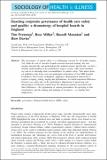Files in this item
Enacting corporate governance of health care safety and quality : a dramaturgy of hospital boards in England
Item metadata
| dc.contributor.author | Freeman, Tim | |
| dc.contributor.author | Millar, Ross | |
| dc.contributor.author | Mannion, Russell | |
| dc.contributor.author | Davies, Huw | |
| dc.date.accessioned | 2015-08-07T16:10:02Z | |
| dc.date.available | 2015-08-07T16:10:02Z | |
| dc.date.issued | 2016-02-02 | |
| dc.identifier | 208043808 | |
| dc.identifier | 020ea9d2-7206-4819-99f1-2e18c79d41f1 | |
| dc.identifier | 84956717375 | |
| dc.identifier | 000369826400004 | |
| dc.identifier.citation | Freeman , T , Millar , R , Mannion , R & Davies , H 2016 , ' Enacting corporate governance of health care safety and quality : a dramaturgy of hospital boards in England ' , Sociology of Health and Illness , vol. 38 , no. 2 , pp. 233-251 . https://doi.org/10.1111/1467-9566.12309 | en |
| dc.identifier.issn | 0141-9889 | |
| dc.identifier.other | Bibtex: urn:4c701da4975693fe138150f1d9a9aadc | |
| dc.identifier.other | ORCID: /0000-0002-2653-3695/work/57821577 | |
| dc.identifier.uri | https://hdl.handle.net/10023/7157 | |
| dc.description | The research was funded by the National Institute for Health Research (NIHR) Health Services and Delivery Research (HS&DR) programme (grant no. 10/1007/02; project title ‘Effective board governance of safe care’; co-applicants R. Mannion, T. Freeman and HTO Davies). | en |
| dc.description.abstract | The governance of patient safety is a challenging concern for all health systems. Yet, while the role of executive boards receives increased scrutiny, the area remains theoretically and methodologically underdeveloped. Specifically, we lack a detailed understanding of the performative aspects at play: what board members say and do to discharge their accountabilities for patient safety. This article draws on qualitative data from overt non-participant observation of four NHS hospital Foundation Trust boards in England. Applying a dramaturgical framework to explore scripting, setting, staging and performance, we found important differences between case study sites in the performative dimensions of processing and interpretation of infection control data. We detail the practices associated with these differences - the legitimation of current performance, the querying of data classification, and the naming and shaming of executives – to consider their implications. | |
| dc.format.extent | 140973 | |
| dc.language.iso | eng | |
| dc.relation.ispartof | Sociology of Health and Illness | en |
| dc.subject | Governance | en |
| dc.subject | National Health Service (NHS) | en |
| dc.subject | Safety | en |
| dc.subject | H Social Sciences (General) | en |
| dc.subject | BDC | en |
| dc.subject | R2C | en |
| dc.subject.lcc | H1 | en |
| dc.title | Enacting corporate governance of health care safety and quality : a dramaturgy of hospital boards in England | en |
| dc.type | Journal article | en |
| dc.contributor.institution | University of St Andrews. School of Management | en |
| dc.identifier.doi | 10.1111/1467-9566.12309 | |
| dc.description.status | Peer reviewed | en |
This item appears in the following Collection(s)
Items in the St Andrews Research Repository are protected by copyright, with all rights reserved, unless otherwise indicated.

